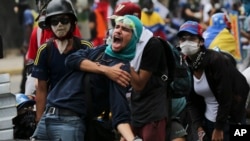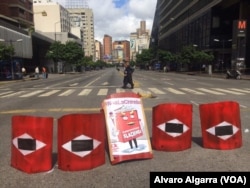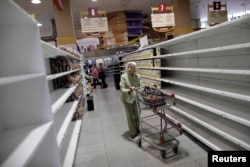The United States announced new sanctions Wednesday against 13 individuals connected to the Venezuelan government and state oil company in an effort designed to dissuade President Nicolas Maduro from implementing a controversial constitutional assembly.
A senior official of President Donald Trump’s administration said the individuals targeted include high-ranking current and former officials connected to the Maduro regime, including two Cabinet ministers, the national elections director, the vice president of finance for state-run oil company PDVSA, and the country’s army and police chiefs, among others.
In a statement accompanying the sanctions announcement, Treasury Secretary Steven Mnuchin said further sanctions are possible after the election Maduro has called for Sunday.
“Anyone elected to the National Constituent Assembly should know that their role in undermining democratic processes and institutions in Venezuela could expose them to potential U.S. sanctions,” he said.
Opposition forces in Venezuela launched a two-day national strike Wednesday aimed at pressuring Maduro to cancel the upcoming vote. A protest march Friday in the capital, Caracas, will follow the strike.
An opposition member taking part in the protest action, Carlos Jimenez, told VOA that the elections Sunday will do nothing to solve Venezuela’s national crisis. People need food, he said, and improvements are desperately needed in the country’s hospitals.
Maduro said he called for a constitutional assembly to restore order in Venezuela, which has been engulfed by violent clashes between protesters and security forces almost every day since April. More than 100 people have been killed and thousands injured.
Opposition leaders say Maduro intends to assume more authoritarian powers once a constitutional assembly acceptable to him is chosen.
Leopoldo López, an opposition leader, called on Venezuelans Wednesday to continue peaceful street protests, and encouraged the military to ignore government orders to clamp down on activists.
As for the constitutional assembly, López said, “We must stop it with peaceful struggle and organization and deep commitment … to fight for democracy [and] peace.”
Maduro’s opponents took part in a 24-hour work stoppage last Wednesday, in which protesters built roadblocks from tree limbs, wires, trash and furniture.
Maduro has continued to forge ahead with his plans despite the intense opposition. He has followed through with a vow to arrest any new Supreme Court judges appointed by the opposition-dominated National Assembly, with three judges detained by intelligence forces since Saturday.
The protests were sparked by growing anger over Venezuela’s crumbling economy. Once rich with oil, the nation’s revenues have tumbled following the sharp drop in global energy prices; corruption by government officials also is seen as a factor in the economic decline.
Food stocks across the country have dwindled or disappeared, forcing many Venezuelans to cross into neighboring Brazil and Colombia to buy food.
Maduro blames his country’s woes on the United States. He has warned the Organization of American States not to intervene in Venezuela, saying that would surely bring on civil war.
VOA Spanish Service correspondent Alvaro Algarra contributed to this report from Caracas.







